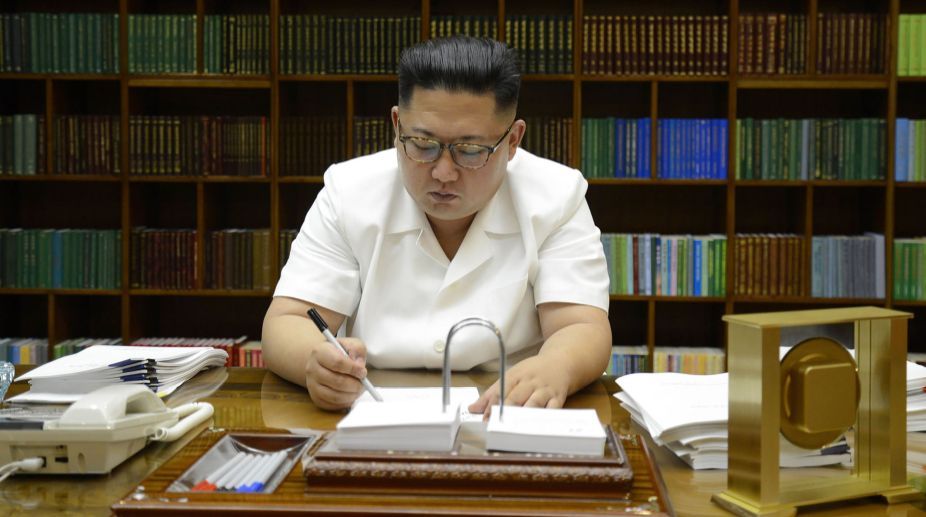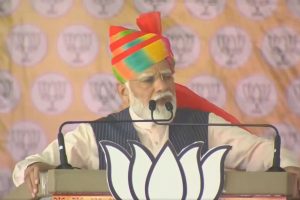At least one of the sanctions ~ a ban on textile exports ~ imposed on North Korea, which has accelerated its nuclear weapons development under the leadership of Kim Jong-Un is likely to hit the “hermit kingdom” severely. Kim, a third-generation dictator, has conducted four of North Korea’s six nuclear tests since assuming power in 2011.
The weapons are being tested at a torrid pace and include solidfuel missiles that have been designed to be launched from road-mobile launchers or submarines and are thus less detectable. North Korea claimed that its latest nuclear test was a detonation of a thermonuclear weapon built for its Intermediate Range Continental Ballistic Missile (ICBM), which could potentially reach deep into the US mainland when perfected. Under Kim’s leadership, North Korea has been pursuing a nuclear device that is small and light enough to fit on an ICBM, without affecting its range and making it capable of surviving re-entry.
In January last year, Pyongyang claimed to have tested a miniaturised hydrogen bomb, also known as a thermonuclear device, but foreign experts were rather sceptical. They suggested that it could have been a “boosted device”, an atomic bomb that uses some hydrogen isotopes to increase its explosive yield. A US official, who studies North Korea’s military politics, said it was too early to determine if the test supported North Korea’s claim that it had succeeded in developing a thermonuclear weapon, “much less one that could be mounted on an ICBM and re-enter the Earth’s atmosphere without burning up”.
“The power is 10 or 20 times or even more than previous ones,” said Kune Y. Suh, a nuclear engineering professor at Seoul National University. Hours before the test, North Korea’s state news agency KCNA had released pictures showing Kim Jong-un, accompanied by scientists, inspecting a silvercoloured, hourglass-shaped warhead during a visit to the country’s nuclear weapons institute.
After the blast, the UN Security Council unanimously approved new sanctions on September 2. These curbs envisage a ban on all textile exports and prohibit any country from authorising new work permits for North Korean workers, two key sources of hard currency.
They also prohibit North Korea from importing any natural gas liquids and condensates, and cap Pyongyang’s imports of crude oil and refined petroleum products. North Korea has already been declared as a rogue state; so by definition it can do whatever it wants. It can, for example, test an H-bomb despite disapproval from abroad, and launch missiles into the seas near other countries. But a rogue state, by the same definition, doesn’t have very many friends. This was demonstrated by the 15-member Security Council which approved limits on inbound oil supplies and tighter inspections of cargo ships going in and out of its ports.
These sanctions, harsher than those approved before by the UN.and individual governments such as the United States, are designed to choke North Korea’s economy. But one measure will pinch harder than the rest ~ the UN resolution banning textile imports coming out of North Korea. The country’s factories depend heavily on the production of coats and suits, for both men and women, to develop its economy through trade, especially with other parts of Asia.
The industry that took hold in the 1970s offers thousands of jobs to a largely poor population and helps close a trade deficit. In 2015 North Korea exported $2.3 billion in goods and imported commodities worth $3.47 billion, That year, the leading export destinations were India, Pakistan and China. The Security Council was aware of the crippling effect of the textile export ban. A Japanese representative to the UN said the resolution strengthens sanctions to “an unprecedented level, with the ban on textile exports expected to reduce its revenues by $ 800 million.”
The Security Council’s ban on oil-related exports to North Korea will hurt industry as well as weapons development. Shipments to the country are expected to fall by 30 per cent, it has been estimated. North Korea has threatened to sink Japan and reduce the US to “ashes and darkness” for leading the campaign for the sanctions. Reacting to the vote on 7 September, North Korea said the US ought to “be beaten to death” for spearheading the penalties.
All 15 members of the Council, including China and Russia, approved the sanctions, which also make it illegal for foreign firms to conclude commercial agreements with North Korean organisations. The increasing frequency, power and confidence displayed by these tests seem to confirm what governments and outside experts have long feared ~ North Korea is closer than ever to its goal of building a military arsenal that can target both US troops in Asia and the US homeland.
It has repeatedly vowed to continue these tests amidst what it calls US hostility, specifically the presence of tens of thousands of US troops in Japan and South Korea. Robust diplomacy has been stalled for years, and there is little indication that senior officials from Pyongyang and Washington might discuss ways to halt the North’s determined march towards inclusion among the world’s nuclear weapons powers.
The missile, which triggered sirens and warning messages in northern Japan but caused no apparent damage to aircraft or ships, was the second fired over Japan in less than a month. The launch has been linked to North Korea’s signal of intent that it means to target the US Pacific island territory of Guam, which is the home of important military assets and appears well within the Hwasong-12’s range. The North American Aerospace Defense Command and the US Pacific Command have observed that the missile posed no threat either to North America or to Guam. India has said that it “deplores” North Korea’s latest nuclear test, calling it a “matter of deep concern that DPRK [Democratic People’s Republic of Korea] has once again acted in violation of its international commitments.”
The nuclear test, the country’s sixth and biggest-ever, runs counter to the objective of denuclearisation of the Korean peninsula, which has been endorsed by Pyongyang itself. Delhi has also expressed concern over North Korean nuclear missiles falling into the wrong hands, saying, “India also remains concerned about the proliferation of nuclear and missile technologies which have adversely impacted national security.”
The test had registered with international seismic agencies as a man-made earthquake near a test site in the North. Japanese and South Korean officials said it was around 10 times more powerful than the tremor picked up after North Korea’s last nuclear test a year ago.
(The writer is a retired Professor of International Trade)











